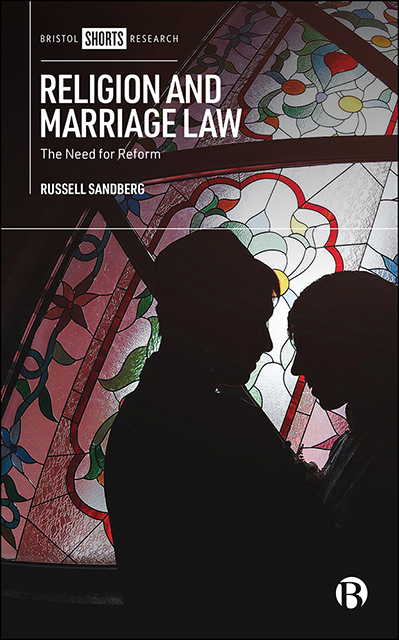Nine - Reforming Cohabitation Rights
Published online by Cambridge University Press: 18 April 2023
Summary
Introduction
This chapter turns to the sixth reform proposal and this is in many ways the most important one. The introduction of the kind of cohabitation rights found in neighbouring jurisdictions would do much to alleviate the problem of unregistered religious marriages. Modernisation of wedding law should reduce the number of unwitting unregistered religious marriages or such marriages that occur because existing legal formalities provide a hurdle. By contrast, cohabitation rights on relationship breakdown would provide a remedy to those who are in unregistered religious marriages where the decision not to enter into a legal marriage has not been entered into voluntarily or where the relationship has changed over time so that one party has become reliant on the other or has suffered a detriment as a result of the relationship. This would apply, for instance, where one party has given up paid work, reduced their hours or forgone promotion in order to raise children, keep the home and/or to look after the other party. These detriments are likely to be gendered and can often be subtle.
However, it is also important not to take a too paternalistic approach. It is vital that cohabitation rights do not trample upon the free choice of the parties. If the parties have made an autonomous choice not to marry and be subject to the rules and obligations that come with marital status, then this should be respected. The lead of other jurisdictions should be followed to allow couples to opt out of such cohabitationbased protection while also ensuring that this is voluntary and fair. This opt-out rather than opt-in requirement would ensure that cohabitation rights are afforded to couples who are choosing to cohabit thinking that they would be entitled to ‘common law marriage’ rights, as well as those where there is an intention to marry but the couple do not get around to it. The safeguard that the opt-out agreement must be voluntary and fair would also allow changing circumstances and power dynamics to be taken into account.
Although the reforms discussed in previous chapters would have the effect of reducing the number of unregistered religious marriages, some would still exist and those couples would be in the same position as cohabitants. Reforming the law relating to cohabitation is needed not only in the context of unregistered religious marriages but more generally.
- Type
- Chapter
- Information
- Religion and Marriage LawThe Need for Reform, pp. 129 - 144Publisher: Bristol University PressPrint publication year: 2021



